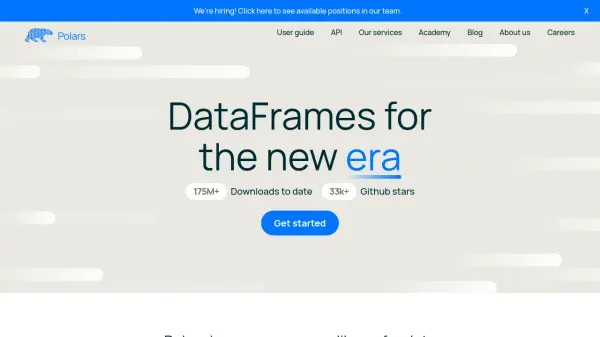What is Polars?
Polars is a cutting-edge, open-source library engineered for advanced data manipulation and analysis, known for its exceptional speed on single machines. Utilizing a multi-threaded query engine written in Rust, Polars leverages efficient parallelism, vectorized operations, and a columnar processing approach to dramatically boost performance for data manipulation tasks.
Polars supports seamless integration with popular programming languages like Python, Rust, and JavaScript, ensuring accessibility and flexibility for developers and data practitioners. It offers robust support for common data formats, database connections, and cloud storage, making it a versatile choice for diverse data workflows. With a strong emphasis on usability and an expressive API, Polars ensures both high performance and ease of use in modern data science and analytics environments.
Features
- Multi-threaded Query Engine: Written in Rust for top-tier performance and effective parallelism.
- Vectorized and Columnar Processing: Enables cache-coherent algorithms for rapid data handling.
- Intuitive Typed API: Simplifies code-writing for complex data transformations.
- Comprehensive Data Format Support: Handles CSV, JSON, Parquet, Delta Lake, AVRO, Excel, Feather, Arrow, and more.
- Database & Cloud Integration: Connects to databases like MySQL, Postgres, SQL Server, and cloud storage such as S3 and Azure.
- Seamless Language Support: Works with Python, Rust, and JavaScript environments.
- Out-of-Core Processing: Efficiently processes datasets larger than system memory using a streaming API.
- Open Source: Freely available under the MIT license with an active developer community.
- Query Optimizer: Automatically determines the most efficient execution plan for user queries.
- Zero-Copy Data Sharing: Utilizes Apache Arrow for efficient collaboration across tools.
Use Cases
- Accelerating large-scale data analytics workflows in Python, Rust, or JavaScript.
- Processing and transforming massive datasets in financial, research, or commercial applications.
- Building data platforms and ETL pipelines with high throughput requirements.
- Handling data wrangling for machine learning and quantitative research tasks.
- Performing real-time or batch data processing with seamless cloud storage integration.
- Enabling efficient data interoperability between various file formats and database sources.
FAQs
-
What programming languages does Polars support?
Polars offers official support for Python, Rust, and JavaScript, allowing users to leverage its capabilities across popular development environments. -
Which data formats can Polars read and write?
Polars supports a wide range of text, binary, and IPC formats, including CSV, JSON, Parquet, Delta Lake, AVRO, Excel, Feather, and Arrow. -
Can Polars integrate with databases and cloud storage?
Yes, Polars allows connections to various databases such as MySQL, Postgres, SQL Server, Sqlite, and cloud storage solutions like S3 and Azure Blob. -
What makes Polars faster than other data processing libraries?
Polars achieves high performance through its multi-threaded Rust engine, vectorized and columnar processing, and an advanced query optimizer. -
Is Polars suitable for processing very large datasets?
Polars supports out-of-core processing, making it capable of efficiently handling datasets that exceed your machine's memory capacity.
Related Queries
Helpful for people in the following professions
Featured Tools
Join Our Newsletter
Stay updated with the latest AI tools, news, and offers by subscribing to our weekly newsletter.





